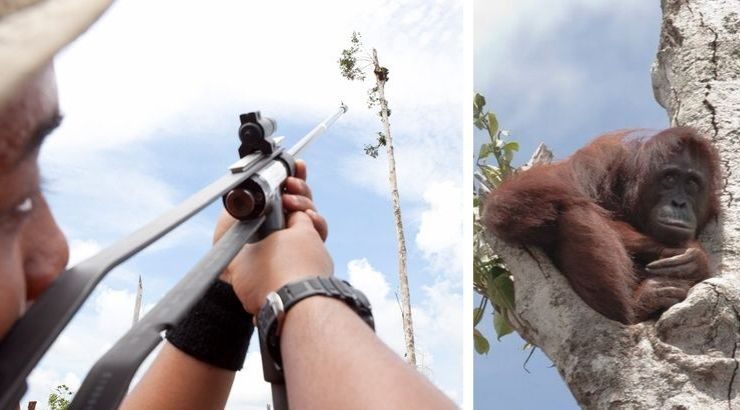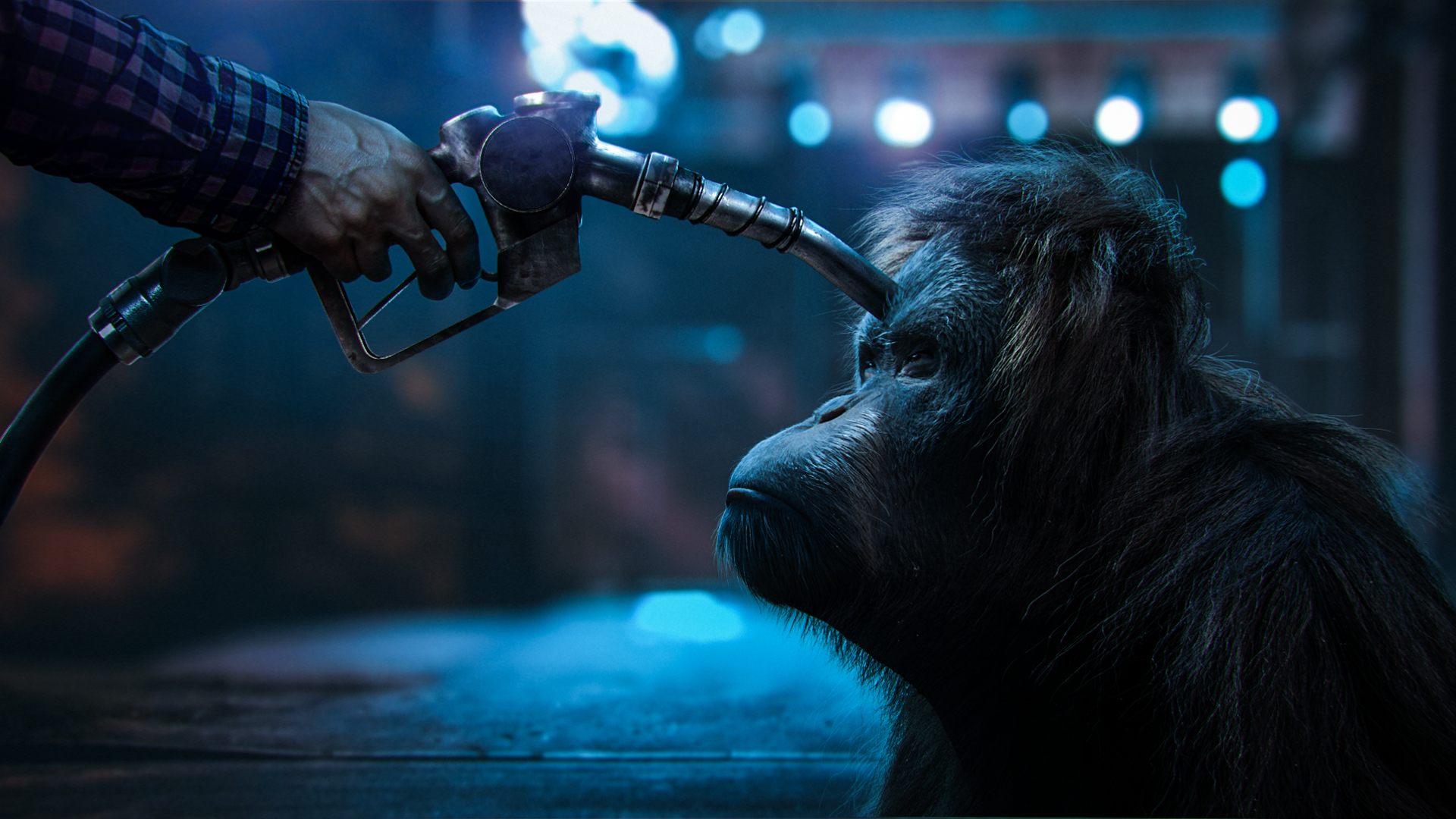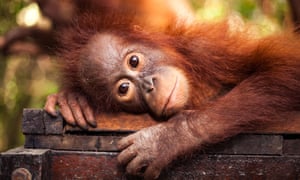Op een foto bij een artikel van Elias Marat is de zwangere en hongerende orang oetan Boon-Mee te zien, Boon-Mee die zich vasthoudt aan de
laatste boom in haar leefgebied van het oerwoud. Het artikel werd gepubliceerd op The Mind Unleashed.
Hartverscheurend
te zien wat de men aanricht in het oerwoud van Borneo, e.e.a. gevangen in de ontzette blik van orang oetan Boon-Mee.....
Boon-Mee
werd door dierenbeschermers met een verdovingspijl uit de boom
gehaald, men had een groot net onder de boom gespannen, waarop ze terechtkwam.....
Dagelijks
worden er op Borneo en Sumatra 25 orang oetans vermoord met kogels
of machete's.... Deze eilanden zijn dan ook de enige plekken op de
wereld waar deze primaten voorkomen. Niet vreemd dus dat de aantallen orang oetans dramatisch zijn gedaald: een eeuw geleden leefden er nog 230.000
orang oetans op Borneo en Sumatra, de aantallen zijn nu: 41.000 op
Borneo en 7.500 op Sumatra.... Tussen 1999 en 2015 is de orang oetan populatie met meer dan de helft gedaald.....
In het leefgebied van Boon-Mee bulldozert men het bos, op andere plekken zet men eenvoudig het bos in brand, wat tot in Maleisië en haar buurlanden elk jaar weer enorme overlast oplevert.... Het ergst getroffen worden echter ook dan de dieren die in dat deel van het oerwoud wonen......
Dit
alles voor palmolie dat tegenwoordig overal in wordt verwerkt, van
koekjes tot shampoo en in zogenaamde duurzame brandstof....
De
hoogste tijd dat het Internationaal Strafhof (ICC) zich ook richt op deze
zaak en niet alleen de vervolging instelt tegen vernielers van het oerwoud en de
massamoordenaars van de dieren die daarin leven, maar ook
de bedrijven die gebruik maken van palmolie in haar producten...... Bedrijven als
Unilever dat zich duurzaam durft te noemen, terwijl het gebruik maakt
van enorm grote hoeveelheden palmolie in haar producten.....
Er is
maar één oplossing voor dit probleem: verbied elk gebruik van
palmolie, immers zolang dit gebruikt wordt (ook uit zogenaamd
duurzame bron) zal oerwoud worden vernield voor winsten..... Lullig genoeg kan je bijna geen producten zonder palmolie kopen, zelfs een flink aantal Ekoplaza producten bevatten palmolie......
Pregnant, Starving Orangutan Clings to Final Tree as Bulldozers Destroy Her Rainforest Home
The
orangutan population has been driven to the brink of extinction by
human activity.

TMU) —
As rainforests around the world continue to be destroyed by human
societies seeking profits in the lush jungle, wild animal populations
who have lived there since time immemorial have seen themselves
displaced, often with nowhere to go.
And
in Borneo, an island in Southeast Asia’s Malay Archipelago, animal
rescue workers filmed the
tragic moment when a desperate, heavily pregnant orangutan clung to
one of the final trees standing in her formerly pristine rainforest
home—right up to the moment when massive bulldozers destroyed what
was left of it.
Boon-Mee
was so weakened and traumatized that she couldn’t imagine leaving
the tree trunk where she found sanctuary as heavy machinery ripped
apart what used to be her home.
As
a result, she was unable to forage for food to feed herself or her
unborn baby, meaning she had nothing to look forward to besides death
by starvation.
Across
Indonesia, palm oil plantations have laid waste to what used to be
the homes of orangutans like Boon-Mee, rendering the primates
homeless in their formerly lush, rich homes in places like Borneo and
Sumatra.
Every
year, apes face slaughter at the hands of humans in the big
agriculture industry, either by gun or machete. Such trends are
reflected in alarming new figures showing that the orangutan
population falls by up to 25 per day.
A
century ago there were over 230,000 orangutans in Southeast
Asia, according
to the
World Wildlife Fund. However, that number has now plummeted to 41,000
in
Borneo
and only 7,500 in Sumatra—the only two places where they can be
found.
However,
this story has
a happy ending, because in this rare case the plantation owners had a
heart and reached out to UK-based charity International Animal Rescue
(IAR) to seek aid for the expecting mom.
An
IAR team backed by local forest officials arrived on the scene after
several hours of journeying through a still-smoldering forest that
had just been freshly burned. When they finally arrived, they were
shocked to find not only Boon-Mee but three other orangutans.
Among
the three was Charanya, another mom who had just delivered her baby
and was desperate to find food. Kalaya had also apparently just had a
baby, and was lactating and semi-conscious—leading the IAR workers
to believe that her baby had either died or was kidnapped to be
someone’s pet.
Boon-Mee
was still alive, but just barely—and was surviving on only tree
bark, thus making her too weak to climb down the tree.
Rescuers
were forced to eventually shoot her with a tranquilizer before
catching her in a net.
IAR
official Lis Key said:
“It’s heartbreaking to see the appalling state of these animals as their habitat is razed for the palm oil industry – they were weak from hunger. It’s a small comfort that this time rather than chase them off or kill them, the company did the right thing and contacted us.”
Palm
oil is a vegetable oil that is extracted from the fruits and seeds of
the oil palm—also known as the African palm—and is a common
additive on supermarket shelves across the globe.
Oil
extracted from the fruit of the palm is not only used in foods like
instant noodles, yogurt, ice cream, and wine, but is also used in
biofuel and a range of household products including laundry
detergents, shampoo and cosmetic goods like lipstick.
Roughly
66 million tons of palm oil are produced each year, driving a trend
that has seen forests burned and land robbed to make room for
plantations, contributing greatly to global deforestation and the
displacement of not only rural human populations, but local animal
species endemic to the region.
Palm
oil production has
largely driven orangutans to the brink of extinction, with the
species now classified as critically endangered. Bornean orangutan
populations have fallen by more than half between 1999 and 2015.
===================================
Zie ook:
'Verkade Meesterbaksels blijken Misbaksels te zijn'
'Unilever 'in veilige groene handen' bij Nils Andersen (o.a. BP)'
'EU: palmolie in diesel is niet duurzaam, maar stoppen met subsidie is amper een optie'
'EU moet palmolie in diesel verbieden, redt de orang oetan en de oerwouden!'
'Greenpeace actie om te voorkomen dat een schip met palmolie aanmeert in Rotterdam'
''Britse reclame code commissie' weigert tv reclame die gericht is tegen het gebruik van palmolie'
'Unilever voor het gerecht gedaagd door ex-arbeiders in Kenia'
'Milieudefensie knettergek geworden, felicitaties n.a.v. palmolieverbod in diesel per 2030'
'Red de orang-oetan van de ondergang, stop de palmolie vernietiging van het oerwoud!'
'PepsiCo verantwoordelijk voor ontbossing oerwoud Borneo...... Boycot Pepsi producten!'
'Regenwouden bufferen niet langer o.a. koolstof, maar stoten dit netto uit, dit door bedrijven als PepsiCo........'
Voor meer berichten over palmolie, klik op dat label, direct onder dit bericht.




 Tom
Picken
Tom
Picken